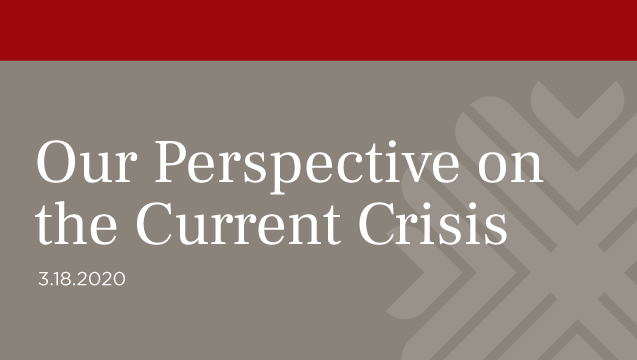Our Perspective on the Current Crisis
In times like this it can be difficult to take a broader perspective and maintain confidence in our economic system and long-term market trends. What we have witnessed these last few weeks is unprecedented in many ways. In the face of a simultaneous “global shutdown” across our world’s largest economies, the accompanying depth, breadth and speed of the decline in global stocks has been disconcerting. In addition, the health concerns related to a pandemic are a new dynamic relative to the financial crisis of 2008-2009, which is the last time that we saw stocks react like this.
We do not know exactly what the next several weeks and months hold. A global pandemic is rife with unknowable variables. Add to all this an oil shock driven by a price war that has decimated large swaths of the global energy industry, already weakened by a freeze in demand. On the positive side, it’s just as difficult to make accurate short-term predictions about the potential benefits of massive government stimulus, success of vaccines or cures, or the potential impact of warming seasonal temperatures on infection rates.
However, in times of uncertainty, we do know that it’s critical to maintain a disciplined approach and a longer-term perspective to achieve investment success. In that regard, we can analyze the current situation and draw conclusions from the similarities and differences of today’s crisis and those of the past.
What’s Different This Time
- We’ve never simultaneously slammed the brakes on several of the largest economies in the world, so we should be prepared for declining economic data for at least the second quarter of 2020. While a recession is all but assured, the exact depth and duration is uncertain at this point.
- The nature of pandemics makes forecasting very difficult in the short-term. It’s a rapidly evolving situation with many variables and possible outcomes.
- This is not a banking crisis, as our nation’s largest banks were well-capitalized and equipped to handle stresses to their balance sheets.
- This is an “out of the blue” event that came to pass in the midst of what had been a very strong U.S. economy. In 2008, the U.S. economy was already dipping into recession before the full throes of the financial crisis hit in the fall.
- Electronic trading technology has rapidly advanced, which has exacerbated the ups and downs of the markets over the last several weeks. This is likely to continue when the markets eventually reverse course and trend higher.
What’s the Same
- Emotion-driven, short-term trading is par for the course when crises hit. Investors are always tempted to time the market, which is a dangerous strategy.
- Our time-tested discipline of maintaining customized portfolios using well-researched, high-quality securities will continue to be a pillar of our wealth planning approach. This won’t change now or in the future.
- Asset allocation works. Even though there have been sharp moves in asset classes, for the most part, our clients’ allocations to quality fixed income and cash have acted as significant shock absorbers to the severe selloff in stocks. For retirees, the bond allocations in portfolios were designed for times like this.
- Markets are resilient, and staying invested for the long term has always paid off. This often happens more quickly than most realize. Since World War II, the average number of months for stocks to return to their previous high is 17 months.
- Governments are again willing to step in as lender of last resort, ensuring orderly markets and ample liquidity for price discovery. Like the 2008-2009 financial crisis, we believe unnatural and severe market disruptions call for fiscal and monetary responses targeted to mitigate short-term market distortions.
- In the short run markets are prone to emotional responses, but in the long run markets ultimately value companies based on their ability to earn and grow profits.
What Could Happen Going Forward
No one knows when this situation will stabilize or when the stock market will bottom, but at some point, it will pass. Once sentiment begins to shift, the economy should be aided by these strong tailwinds:
- An extremely accommodative environment for stocks due to a combination of attractive valuations, low fixed-income yields, and a world awash in liquidity
- Pent-up consumer demand from a consumer base that has essentially been in shutdown mode
- Historically low interest rates
- A silver lining to the oil shock – reduced energy costs for consumers and corporations
- Massive global stimulus, which has been somewhat ignored by investors in the midst of the daily virus headlines
As your trusted advisor, it is our role to help you navigate through uncertain, challenging times like we are experiencing now. Our firm has been in existence for over 50 years, and we’ve been through many bear markets and global shocks. While we don’t know exactly what’s around the corner, we are confident that holding to time-tested principles of proper asset allocation, quality security selection, and diversification will allow us to ride out this storm and ultimately achieve your financial goals. We appreciate your continued confidence, and please know that our experienced team is here to help in any way that we can.

Jason O. Jackman, CFA
President

